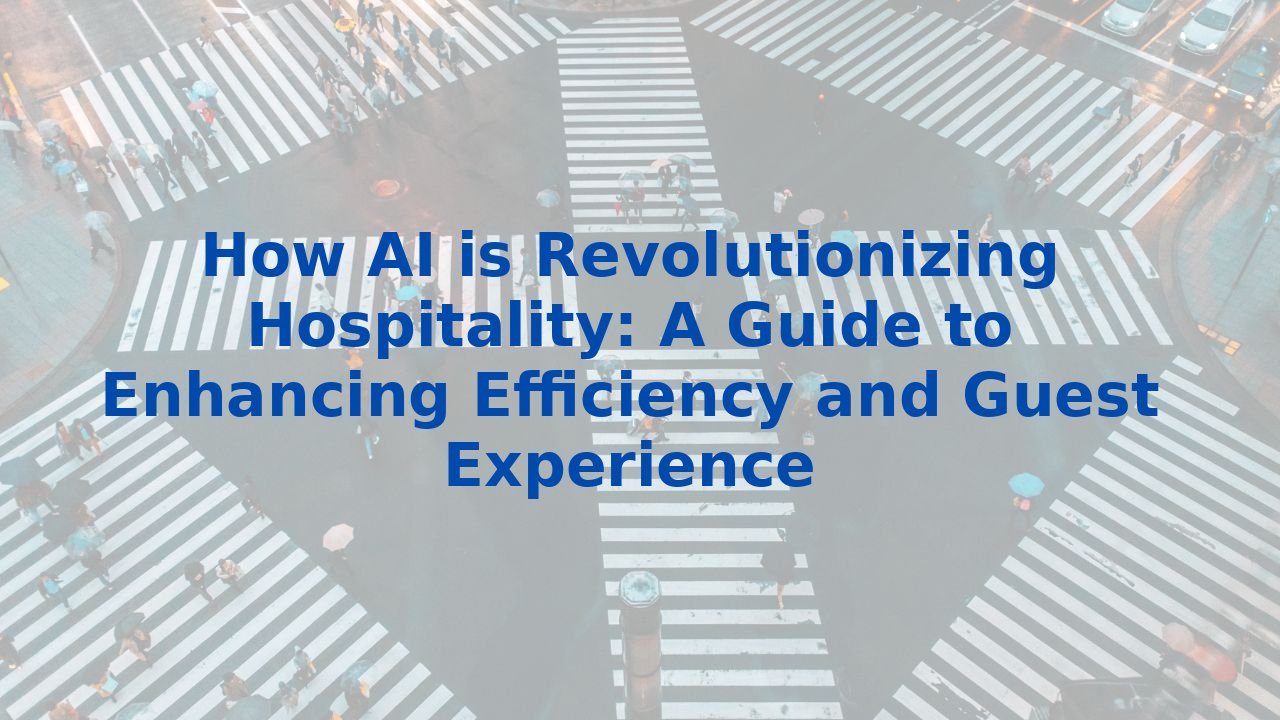How AI is Revolutionizing Hospitality: A Guide to Enhancing Efficiency and Guest Experience
How AI is Revolutionizing Hospitality: A Guide to Enhancing Efficiency and Guest Experience
The hospitality industry stands at a transformative crossroads, where the pressures of managing costs and elevating guest satisfaction collude with groundbreaking technological advancements. Among these innovations, artificial intelligence (AI) emerges as a formidable ally, reshaping the industry's landscape. In this blog post, we will delve into the multifaceted ways AI enhances operational efficiency while simultaneously enriching the guest experience—a revolution that every hospitality leader should embrace.
Enhancing Efficiency
A critical attribute of successful hospitality management is efficiency. From the first point of contact to post-stay follow-ups, every interaction can benefit from AI integration. Here are pivotal ways AI streamlines operations:
Automated Customer Service
Imagine a world where routine inquiries don’t burden your human staff. AI-powered chatbots and virtual assistants bring this vision to life. Available 24/7, these systems swiftly field questions, offering immediate responses that enhance service quality. By automating basic interactions, hotels can redirect valuable human resources toward more nuanced, complex tasks—ultimately enriching the guest experience.
Operational Optimization
AI goes beyond front-end interactions; it’s a game changer for back-end efficiency. By employing advanced algorithms, properties can optimize inventory management, predict maintenance schedules, and even streamline housekeeping operations. Sensors linked to AI systems help regulate room environments, ensuring smooth operations and consistent guest satisfaction. This deep integration of AI doesn't just enhance efficiency—it fortifies the entire structure of hospitality operations.
Predictive Analytics
Understanding market dynamics is vital for success. AI excels at processing vast datasets to forecast demand and adjust room availability, thus maximizing occupancy rates. With predictive analytics, hotels can avoid the pitfalls of overbooking or underbooking, allowing for strategic decision-making that translates into improved revenues and guest satisfaction.
Personalizing Guest Experiences
In a world where customer expectations are at an all-time high, personalization can make a significant difference in guest loyalty. AI empowers hospitality businesses to cultivate unique experiences tailored for each visitor.
Customized Recommendations
Leverage AI-driven recommendation engines to offer personalized services and activities that resonate with guests. By analyzing individual preferences and past interactions, hotels can suggest bespoke room settings, curated experiences, and rewards that reflect guest desires—resonating with the notion that true hospitality lies in understanding and fulfilling client expectations.
Real-Time Assistance
Consider the impact of instant assistance. AI-enhanced chatbots not only address queries but also provide tailored solutions in real-time. This immediacy fosters a sense of value and connection, as guests feel recognized and understood throughout their journey, significantly elevating their overall experience.
Revenue Management
The financial health of a hospitality business primarily revolves around smart revenue management. AI plays a pivotal role in mastering this delicate balance.
Dynamic Pricing
AI systems facilitate dynamic pricing by analyzing real-time data on market demand, local events, and other influential factors. This capability empowers hotels to optimize room rates—making them competitive without sacrificing profitability.
Data-Driven Insights
With AI, data isn’t merely a volume of numbers; it becomes a strategic asset. Machine learning algorithms harness historical data to identify profitable market segments and optimize pricing strategies on the fly. This intelligence becomes a cornerstone for making calculated, data-driven decisions that bolster revenue.
Training Employees for AI
Integrating AI is only half the equation; the other half lies in empowering employees. Training teams to work collaboratively with AI technology can yield significant benefits.
Enhanced Productivity
As AI handles monotonous tasks, your human resources can redirect their focus on strategic initiatives, such as building robust relationships and enhancing service personalization. Training equips employees to capitalize on these automated processes, ultimately enhancing productivity and operational efficiency.
Improved Decision-Making
Data analytics and predictive modeling are indispensable in the era of AI. By educating staff on effectively interpreting insights derived from these advanced tools, businesses foster an environment where data-driven decision-making flourishes. This is vital for agile strategy execution and proactive operational management.
Conclusion
The integration of AI within the hospitality industry promises profound transformations that amplify both efficiency and guest satisfaction. From automating service to personalizing experiences and optimizing revenue, AI serves as a powerful ally for innovation and growth. For businesses ready to embrace this future, training employees to adeptly utilize AI tools ensures not just seamless operations but also the magical touch that keeps guests returning. The journey of implementing AI might seem daunting, but the rewards—enhanced efficiency, increased satisfaction, and loyalty—are well worth the investment.



